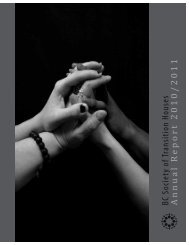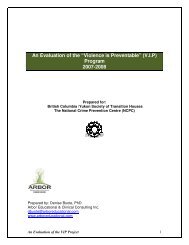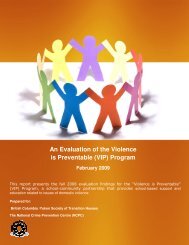reducing barriers to support - BC Society of Transition Houses
reducing barriers to support - BC Society of Transition Houses
reducing barriers to support - BC Society of Transition Houses
You also want an ePaper? Increase the reach of your titles
YUMPU automatically turns print PDFs into web optimized ePapers that Google loves.
ECON OM IC STA TU S<br />
Many <strong>of</strong> the intersecting identities mentioned above have pr<strong>of</strong>ound impacts on women’s economic<br />
status. One in five women in Canada lives in poverty. 68 On average, women earn 62 percent <strong>of</strong> what men<br />
earn, with female lone-parents, Immigrant women and Women <strong>of</strong> Colour, including Aboriginal women,<br />
most affected by poverty. 69 Economic status, in turn, affects levels <strong>of</strong> mental wellness and substance<br />
use. 70<br />
Poverty can impact a woman’s ability <strong>to</strong> find safe, affordable housing and <strong>to</strong> leave violent<br />
contexts. In addition, the services available <strong>to</strong> women with varying levels <strong>of</strong> mental wellness and<br />
substance use vary with her economic status. Women who do not have access <strong>to</strong> financial resources or<br />
extended health care benefits are restricted <strong>to</strong> publicly funded programming and are unable <strong>to</strong> afford<br />
private treatment. 71 Finally, women who face income <strong>barriers</strong> (especially Aboriginal women) are more<br />
likely <strong>to</strong> have their children apprehended which can further negatively impact levels <strong>of</strong> mental wellness<br />
and substance use. 72<br />
DISC USSI ON POINT 2<br />
How can we ensure that the programming in each <strong>of</strong> our sec<strong>to</strong>rs is inclusive and responsive <strong>to</strong> the various<br />
needs <strong>of</strong> the diversity <strong>of</strong> women in <strong>BC</strong> and the Yukon What mechanisms can we put in place <strong>to</strong> hold<br />
ourselves accountable<br />
CURRENT POLICIES, PROCEDURES AND PRACTICES IN <strong>BC</strong> AND THE<br />
YUKON<br />
<strong>BC</strong>STH will be distributing a survey <strong>to</strong> all <strong>of</strong> its members <strong>to</strong> learn about current practices, policies and<br />
procedures when it comes <strong>to</strong> <strong>support</strong>ing women fleeing violence who have varying levels <strong>of</strong> mental<br />
wellness and substance use. A short report will be composed from the findings and will inform the<br />
development <strong>of</strong> Promising Practices for <strong>support</strong>ing women fleeing violence who have varying levels <strong>of</strong><br />
mental wellness and substance use.<br />
15






